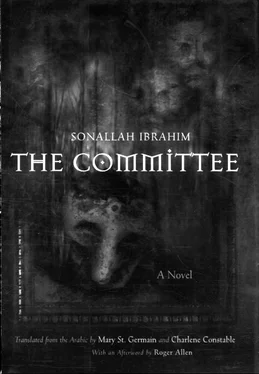The magazine took this as an opportunity to print a brief biography of him: how he came from a poor family, and how fortune smiled on him when the revolution broke out, because he was related to one of its leaders. This connection set him on the road to success by enabling him to get permission for a movie producer to make three comedies on the army, the navy, and the air force. In return he got a share of the take.
The magazine went on to say that once he had accumulated capital, it was not difficult to double it in a short time. It wasn't his fault that those running the economy, having been carried away by socialist ideas, had tied it up in a way that only special talents and consequently high fees could undo. By means of the extensive relationships he had reinforced through a series of successful marriages, the Doctor profited from removing these difficulties for whomever so desired. But the true beneficiary was the national economy. As an example, the magazine cited his role as a public sector contractor. He steered most of the projects to private companies he co-owned. Whatever the opinion of this practice, he indisputably helped support both private enterprise and the completion of many important public service projects, whose fruits the Egyptians enjoy today. These projects could never have been realized if they had been left up to the public sector.
At that time, the Doctor underwent a rigorous ordeal. The authorities seized him and put him in jail. It is hard to say why, since accounts differ. Rumor has it that he participated in an attempt to overthrow the government, and some said he had gone too far in advocating socialism. Someone confirmed that he was implicated in questionable financial dealings which were then illegal.
The magazine delved into the various rumors about him, describing them as the price paid for success in Arab countries. Its example was the rumor claiming that he attended the famous party held at one of the Egyptian air bases on the eve of the June War in 1967. According to the article, this rumor didn't mean anything whatsoever, since most Egyptian leaders attended it. As for other rumors attempting to link him with the surrender of the Golan Heights, there was a complete lack of evidence. As proof of his patriotism, the magazine cited his role in the war of attrition, when he won a contract to build gigantic fortifications costing millions of dollars. Rumors continued to fly even while he carried on this noble pursuit.
The magazine also said that when Egypt was liberated from Soviet domination in the '70s, his life entered a new stage as he transferred his activities to supplying arms, a profession which always yields astronomical profits. He became one of the largest suppliers, and so got credit for the victory in the October War. However, the largest profits resulted from the skyrocketing price of petroleum after the war, and so didn't find their way to his pockets; since he failed to attain them through his own short-lived third marriage, he then tried to succeed by marrying off his daughter.
Although the Doctor didn't stop importing weapons for limited conflicts in the Middle East and Africa, and although he made known, more than once, his resolve to form a strong company of mercenaries, ready to serve anybody willing to pay the price, he nevertheless became an advocate of peace. He worked energetically to import foodstuffs, cars, and airplanes, thus benefiting from the open-door policy. In this connection, the magazine cited the statement prevalent throughout the Arab world, "Even if the Doctor doesn't bake the pie, he's first in line for a slice."
The magazine noted the many colorful stories about him. Take for example, the one about the million uniforms leftover from the Vietnam War, which were donated by the United States Army on behalf of poor Egyptian peasants. They found their way to his warehouses, where they were sold in turn to a number of merchants for the equivalent of six million pounds.
It concluded the article by saying, "One can only admire the vitality and energy of this Arab billionaire. This vitality emerged and left its mark on the last decade. In spite of the price terrorists put on his head after his cooperation with Israeli firms became common knowledge, his energy will undoubtedly last a long time before it withers.
"Because of his age, he now needs artificial and chemical aids above and beyond a face-lift in order to carry out his conjugal obligations when visiting his numerous mansions scattered throughout the Arab world. However, he needs no assistance in the financial dealings of political activities he manipulates from behind the scenes. Whatever is said about his moral principles, it cannot be denied that the Doctor and his ilk carry the torch of progress, peace, and stability for the region, which has long been disrupted by extremism."
I entered the whole article in my notebook, which took several hours. Afterward, happy, I returned to my apartment and got busy at once transferring my information onto separate index cards, or, depending on the subject, adding some parts to existing cards.
No sooner had I finished than I felt I had completed my preparations. There was nothing preventing me from starting the second stage of the research.
I was inclined to make his biography the backbone of my work: to begin with his family and childhood, then to move on to his school days and youth, and from there to his patriotic activities. I would continue with his rise to power, which encompassed the three consecutive wars: the Tripartite Attack in 1956, the June War in 1967, and finally the October War in 1973. I would finish with the pinnacle he now occupies in the Arab world.
But I soon perceived the gaps in this program. The information available to me from the first stage of this life was extremely sparse. I had not known until now whether his nickname "the Doctor" was supported by a Ph.D., or whether the appellation was a convention, with nothing original or unique to it. The most impor tant thing in all this was that it put me face-to-face with the question that had to be answered, namely, what comes after a climax? The strong relationship between this question and one meaning Arabs give to "luminous," as in "She glows"-the fetus stirring in the womb-is apparent. The significance of the answer itself is also clear, since his destiny is a simple matter after so much study.
I was so deep in thought I didn't sense it getting dark. When I did notice, I lit the electric light on my desk. At that moment the doorbell rang.
As I had mentioned before, I live on the seventh floor and there is no elevator. In spite of the law requiring owners of apartment buildings with more than five floors to provide an elevator, my landlord was able to get around the law quite easily by building the last two floors set back a little, so that they are not readily visible from the street. This way the law was satisfied and so did nothing, no matter how much we residents complained to the appropriate agencies.
At any rate, this didn't encourage anyone to visit me, which didn't bother me at all. On the contrary, lately it was a course of deep, intense relief since I was so overworked. If anyone did come, he would be compelled to climb the stairs. When he got to the top floor, he would be winded and his footsteps would be heavy. The walls were so thin, due to another attempt by the owner to avoid the clearly defined building codes, that while I was sitting at my desk, even before the doorbell rang, I could distinctly hear footsteps.
I had been hearing footsteps for a while. But because I was so deep in thought, it didn't dawn on me until I noticed how many there were. I was surprised when I opened the door and found so many ladies and gentlemen crowded into the narrow hall in front of my apartment.
The stairs were black as pitch because the landlord had removed the light fixture in an attempt to pressure the residents into withdrawing their complaints. Because of this, I couldn't see the faces of the visitors clearly at first. When I recognized the Committee members before whom I had appeared nearly a year earlier, I was profoundly astonished.
Читать дальше











